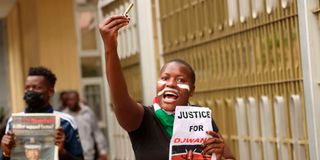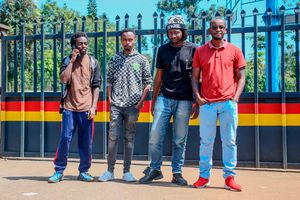
Protesters along Harambee Avenue in Nairobi on June 12, 2025 during protests over the death of blogger Albert Ojwang, who died in police custody.
Apologies for sounding like a stuck record. Early this month, this column noted President William Ruto’s public apology for the string of crimes committed by security agencies under his watch. It was an important acknowledgement of wrongdoing and implicit admission of guilt.
However, there was a caveat in that an apology not accompanied by a demonstrated willingness to punish the perpetrators amounts to nothing but empty words.
My position was that impartial and independent investigation could not be entrusted to the prime suspects in the reported abductions, torture, illegal confinements, enforced disappearances and murders.
Like I’d stated in the past, heads of all the security agencies implicated, the National Police Service (particularly the Directorate of Criminal Investigations), the National Intelligence Service and all their officers in the secretive death squads, would first have to step aside to make way for investigations and prosecution.
I also doubted the ability of the Independent Policing Oversight Authority or the Commission on Administrative Justice (The Ombudsman) to play any effective role, both having proved themselves toothless bulldogs in probing police excesses since the Gen Z uprising of June last year.
That column was published on June 3. Before the week was out, Albert Ojwang, a young schoolteacher had been bludgeoned to death in police custody. His crime? A social media post deemed defamatory of Deputy Inspector-General of Police Eliud Lagat!
The case that sparked a national outcry might well indicate a transition from the so-called broad-based government of President Ruto and former opposition leader Raila Odinga to a blood-based regime.

A protesting youth holds a spent bullet cartridge as he shouts during an anti-government protests.
Both the two regime principals have condemned the brutal killing apparently perpetrated in the cells at Nairobi’s Central Police station. They have demanded speedy investigations and prosecution of all those involved. IPOA is investigating the matter and has announced interrogation so far of scores of police officers, a few arrests and court arraignments.
Even Parliament got into the act, with the Senate holding a special sitting to interrogate the issue.
Yet despite the ritual ‘No stones will be left unturned’ vows, there are disturbing signals that we are just being taken through a charade.
Appearing before the Senate, Inspector-General of Police Douglas Kanja, Directorate of Criminal Investigations Mohammed Amin, and even the Cabinet Secretary for Interior Kipchumba Murkomen, seemed to bend over backwards in efforts to shield Mr Lagat.
Investigations
They trotted out the usual claptrap that investigations were still in progress, conveniently ignoring the fact that junior officers had been interdicted and even arraigned in the course of investigations.
Even IPOA, now headed by Mr Ahmed Issack Hassan, seemed to be tiptoeing around the matter of senior officers who definitely should have been persons of interest. Mr Lagat is one. The other is Mr Amin, who commands the DCI officers responsible for the human rights travesties recorded under the Ruto regime.
It was officers under his command who responded to Mr Lagat’s complaint and arrested Ojwang.
Logic dictates that Mr Amin should be treated as a suspect rather than be accorded the opportunity to defend his DCI squad before the Senate.
He surely should be asked to explain why he had a mere social media post investigated by a Serious Crimes police unit that would be better utilised dealing with terrorism, organised crime, arms trafficking, narcotics smuggling, institutionalised corruption and other serious threats to national security.

Two vehicles torched amid protests on June 12th 2025 along Nkrumah Lane in Nairobi.
That waste of scarce police resources is in itself a ground for removal from office. In fact, it follows a pattern where Mr Amin and Director of Public Prosecutions Renson Ingonga have been misusing their offices by investigating and prosecuting social media users who commit no crimes other than offend the fragile sensibilities of influential personalities.
Legitimate scrutiny
Also in the mix is National Intelligence Service boss Noordin Haji, who is part of the security network dedicated to protecting President Ruto from legitimate scrutiny and criticism, hence the previous description of those fellows as regime youth wingers.
They have taken up matters that should be handled through civil libel or defamation cases and treated them as serious crimes against the Republic. In this particular case, a young man was beaten to death.
The panic and desperation might well be a telling indicator that there was some truth to Ojwang’s social media post. A separate investigation might be required into that.
Meanwhile, we are promised thorough investigations, but at the same time, some government-leaning politicians and paid keyboard warriors have been deployed to spin patently false narratives linking the Ojwang murder to the opposition. Pathetic, but also sends very worrying signals about the likely outcome of the investigations.
[email protected]; @MachariaGaitho






